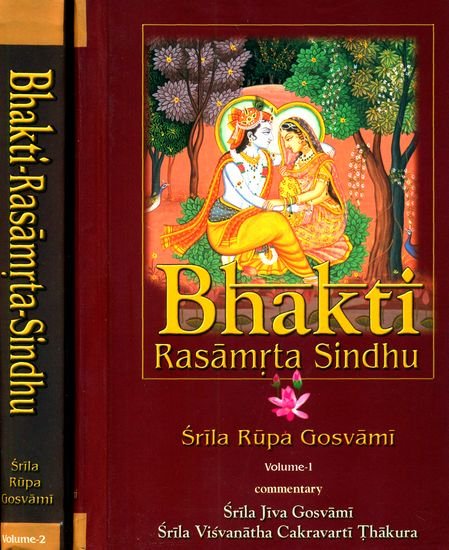Bhakti-rasamrta-sindhu
by Śrīla Rūpa Gosvāmī | 180,912 words
The English translation of the Sri Bhakti-rasamrta-sindhu verse 2.1.215; a medieval era Sanskrit book, written by Rupa Goswami (fl. 15th century) which represents a devotional (bhakti) masterpiece. In this work Goswami describes the nature and different forms of pure love (rasa) as well as various other topics on Vaishnavism and devotion.
Verse 2.1.215
Sanskrit text, Unicode transliteration and English translation:
यथा वा विदग्ध-माधवे (१.२६) —
रुन्धन्न् अम्बु-भृतश् चमत्कृति-परं कुर्वन् मुहुस् तुम्बुरुं
ध्यानाद् अन्तरयन् सनन्दन-मुखान् विस्मेरयन् वेधसम् ।
औत्सुक्यावलिभिर् बलिं चटुलयन् भोगीन्द्रम् आघूर्णयन्
भिन्दन्न् अण्ड-कटाह-भित्तिम् अभितो बभ्राम वंशी-ध्वनिः ॥२.१.२१४॥yathā vā vidagdha-mādhave (1.26) —
rundhann ambu-bhṛtaś camatkṛti-paraṃ kurvan muhus tumburuṃ
dhyānād antarayan sanandana-mukhān vismerayan vedhasam |
autsukyāvalibhir baliṃ caṭulayan bhogīndram āghūrṇayan
bhindann aṇḍa-kaṭāha-bhittim abhito babhrāma vaṃśī-dhvaniḥ ||2.1.214||
English translation
Sanskrit text, Unicode transliteration and English translation:
अनोथेर् एxअम्प्ले, fरोम् विदग्ध-माधव:
“थे सोउन्द् ओf कृष्ण’स् fलुते wअन्देरेद् एवेर्य्wहेरे, पिएर्चिन्ग् थोउघ् थे स्हेल्ल् ओf थे उनिवेर्से. इत् स्तोप्पेद् थे च्लोउद्स्, अमzएद् थे गन्धर्व तुम्बुरु, ब्रोके थे मेदिततिओन् ओf थे योगीस् हेअदेद् ब्य् सनन्द, अस्तोनिस्हेद् ब्रह्मा, मदे बलि उन्स्तेअद्य् wइथ् लोन्गिन्ग्, अन्द् मदे अनन्त दिzzय्.”
(६४) रूप-माधुर्यं, यथा तृतीये (३.२.१२) —
यन् मर्त्य-लीलौपयिकं स्व-योग-
माया-बलं दर्शयता गृहीतम् ।
विस्मापनं स्वस्य च सौभगर्द्धेः
परं पदं भूषण-भूषणाङ्गम् ॥२.१.२१५॥Another example, from Vidagdha-mādhava:
“The sound of Kṛṣṇa’s flute wandered everywhere, piercing though the shell of the universe. It stopped the clouds, amazed the Gandharva Tumburu, broke the meditation of the yogīs headed by Sananda, astonished Brahmā, made Bali unsteady with longing, and made Ananta dizzy.”(64) rūpa-mādhuryaṃ, yathā tṛtīye (3.2.12) —
yan martya-līlaupayikaṃ sva-yoga-
māyā-balaṃ darśayatā gṛhītam |
vismāpanaṃ svasya ca saubhagarddheḥ
paraṃ padaṃ bhūṣaṇa-bhūṣaṇāṅgam ||2.1.215||
English translation
(64) rūpa-mādhuryaṃ: the sweetness of His form. An example from the Third
Canto of Śrīmad-Bhāgavatam [3.2.12]:
“The Lord appeared in the mortal world by His internal potency, yoga-māyā. He came in His eternal form, which is just suitable for His pastimes. This form is wonderful for even for the Lord Himself in His form as the Lord of Vaikuṇṭha, because He is the highest perfection of beauty, enhancing the beauty of all ornaments.”
